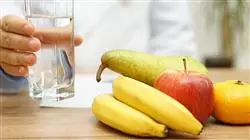University certificate
Scientific endorser

The world's largest faculty of nutrition”
Introduction to the Program
People who perform intense Physical Exercise on a regular basis need to eat a balanced diet rich in nutrients, so it is important to have Professionals capable of guiding them in nutritional matters’’

Sports Nutrition is a booming field of work. In recent years there has been a boom in Sports Nutrition. More and more people have introduced sport into their daily lives, and this requires specific energy needs that, without the help of a Professional, cannot be adequately acquired.
This program offers the student the possibility of expanding and updating knowledge in Sports Nutrition, using the latest educational technology. It offers a global vision of Clinical and Sports Nutrition, while focusing on the most important and innovative aspects: invisible training or adequate diet for athletes, and nutrition before, during, and after exercise.
In this way, this program allows specialization in the field of Sports Nutrition in areas of special interest such as: nutrigenetics, nutrigenomics, nutrition and obesity, hospital dietetics, nutritional trends and specific needs of elite athletes.
The teaching team of this Professional master’s degree in Sports Nutrition has made a careful selection of each of the topics of this specialization in order to offer students the most complete study opportunity possible and always linked to current events.
As it is an online Professional master’s degree, the student is not bound by fixed schedules or the need to move to another physical location, rather, they can access the content at any time of the day, balancing their professional or personal life with their academic life.
Only with a proper specialization, you will know the best way to advise your patients in nutritional matters’’
This Professional master’s degree in Sports Nutrition contains the most complete and up-to-date scientific program on the market. The most important features include:
- The graphic, schematic and practical contents of the course are designed to provide all the essential information required for professional practice
- Exercises where the self-assessment process can be carried out to improve learning
- An algorithm-based interactive learning system, designed for decision-making for patients with nutritional challenges
- Theoretical lessons, questions to the expert, debate forums on controversial topics, and individual reflection assignments
- Content that is accessible from any fixed or portable device with an Internet connection
This Professional master’s degree is the best investment you can make when selecting a refresher program for two reasons: in addition to updating your knowledge of Sports Nutrition, you will obtain a qualification from TECH Global University’’
It includes, in its teaching staff, professionals belonging to the field of nutrition, who bring to this program the experience of their work, in addition to recognized specialists from reference societies and prestigious universities.
The multimedia content, developed with the latest educational technology, will provide the professional with situated and contextual learning, i.e., a simulated environment that will provide immersive learning programmed to study in real situations.
This program is designed around Problem-Based Learning, whereby the professional must try to solve the different professional practice situations that arise throughout the program. For this purpose, the professional will be assisted by an innovative interactive video system created by renowned and experienced experts in Sports Nutrition with extensive experience.
This Professional master’s degree offers education in simulated environments, which provides an immersive learning experience designed to prepare for real-life situations"

This 100% online Professional master’s degree will allow you to balance your studies with your professional work while increasing your knowledge in this field"
Why study at TECH?
TECH is the world’s largest online university. With an impressive catalog of more than 14,000 university programs available in 11 languages, it is positioned as a leader in employability, with a 99% job placement rate. In addition, it relies on an enormous faculty of more than 6,000 professors of the highest international renown.

Study at the world's largest online university and guarantee your professional success. The future starts at TECH”
The world’s best online university according to FORBES
The prestigious Forbes magazine, specialized in business and finance, has highlighted TECH as “the world's best online university” This is what they have recently stated in an article in their digital edition in which they echo the success story of this institution, “thanks to the academic offer it provides, the selection of its teaching staff, and an innovative learning method aimed at educating the professionals of the future”
A revolutionary study method, a cutting-edge faculty and a practical focus: the key to TECH's success.
The most complete study plans on the university scene
TECH offers the most complete study plans on the university scene, with syllabuses that cover fundamental concepts and, at the same time, the main scientific advances in their specific scientific areas. In addition, these programs are continuously being updated to guarantee students the academic vanguard and the most in-demand professional skills. In this way, the university's qualifications provide its graduates with a significant advantage to propel their careers to success.
TECH offers the most comprehensive and intensive study plans on the current university scene.
A world-class teaching staff
TECH's teaching staff is made up of more than 6,000 professors with the highest international recognition. Professors, researchers and top executives of multinational companies, including Isaiah Covington, performance coach of the Boston Celtics; Magda Romanska, principal investigator at Harvard MetaLAB; Ignacio Wistumba, chairman of the department of translational molecular pathology at MD Anderson Cancer Center; and D.W. Pine, creative director of TIME magazine, among others.
Internationally renowned experts, specialized in different branches of Health, Technology, Communication and Business, form part of the TECH faculty.
A unique learning method
TECH is the first university to use Relearning in all its programs. It is the best online learning methodology, accredited with international teaching quality certifications, provided by prestigious educational agencies. In addition, this disruptive educational model is complemented with the “Case Method”, thereby setting up a unique online teaching strategy. Innovative teaching resources are also implemented, including detailed videos, infographics and interactive summaries.
TECH combines Relearning and the Case Method in all its university programs to guarantee excellent theoretical and practical learning, studying whenever and wherever you want.
The world's largest online university
TECH is the world’s largest online university. We are the largest educational institution, with the best and widest online educational catalog, one hundred percent online and covering the vast majority of areas of knowledge. We offer a large selection of our own degrees and accredited online undergraduate and postgraduate degrees. In total, more than 14,000 university degrees, in eleven different languages, make us the largest educational largest in the world.
TECH has the world's most extensive catalog of academic and official programs, available in more than 11 languages.
Google Premier Partner
The American technology giant has awarded TECH the Google Google Premier Partner badge. This award, which is only available to 3% of the world's companies, highlights the efficient, flexible and tailored experience that this university provides to students. The recognition as a Google Premier Partner not only accredits the maximum rigor, performance and investment in TECH's digital infrastructures, but also places this university as one of the world's leading technology companies.
Google has positioned TECH in the top 3% of the world's most important technology companies by awarding it its Google Premier Partner badge.
The official online university of the NBA
TECH is the official online university of the NBA. Thanks to our agreement with the biggest league in basketball, we offer our students exclusive university programs, as well as a wide variety of educational resources focused on the business of the league and other areas of the sports industry. Each program is made up of a uniquely designed syllabus and features exceptional guest hosts: professionals with a distinguished sports background who will offer their expertise on the most relevant topics.
TECH has been selected by the NBA, the world's top basketball league, as its official online university.
The top-rated university by its students
Students have positioned TECH as the world's top-rated university on the main review websites, with a highest rating of 4.9 out of 5, obtained from more than 1,000 reviews. These results consolidate TECH as the benchmark university institution at an international level, reflecting the excellence and positive impact of its educational model.” reflecting the excellence and positive impact of its educational model.”
TECH is the world’s top-rated university by its students.
Leaders in employability
TECH has managed to become the leading university in employability. 99% of its students obtain jobs in the academic field they have studied, within one year of completing any of the university's programs. A similar number achieve immediate career enhancement. All this thanks to a study methodology that bases its effectiveness on the acquisition of practical skills, which are absolutely necessary for professional development.
99% of TECH graduates find a job within a year of completing their studies.
Professional Master's Degree in Sports Nutrition
Due to current trends regarding the establishment of physical activity as an indispensable element of the daily routine of most individuals, sports nutrition accompaniment has gained prominence as one of the specialties of the nutrition sector with the highest demand at present. This situation has been evidenced in the exponential growth of occupational opportunities available to professional experts in the field. Understanding the need for academic updating that accompanies the growing interest of nutritionists for optimal access to this important labor field, at TECH Global University we have designed our Professional Master's Degree program in Sports Nutrition. In this postgraduate program, special attention will be paid to new trends and approaches to dietary planning adapted to the various sports modalities. In addition, it will deepen in the modernization of the following aspects: the knowledge of the guidelines and elements that determine the correct nutrition in the different phases of sports practice; and the identification of the various methodologies used in the processes of assessment of the specific energy needs of the athlete.
Study an Online Professional Master's Degree in Sports Nutrition
The diversity of contexts and scenarios that modern sports nutrition support must face, such as the development of injuries or the possible decrease in the physical performance of the athlete, make this specialty a highly demanding field with respect to the degree of preparation and knowledge of its professionals. In our Professional Master's Degree program you will approach sports nutrition from the identification of the new scopes, opportunities and possibilities of intervention in the sector, contemplating, in turn, the updating of the following topics: the particularities and elements to be taken into account in the correct nutritional advice in the process of recovery from a sports injury; and the knowledge of current nutritional trends and their impact on the development of dietary plans applied to high performance athletes.







